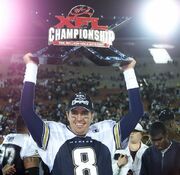XFL 2001[]

The XFL IN 2001 was a professional American football league that played its only season in 2001. As originally conceived, the XFL was operated as a joint venture between the World Wrestling Federation (now known as WWE) and NBC. The XFL was conceived as an outdoor football league that would take place during the NFL off-season, and promoted as having fewer rules and encouraging rougher play than other major leagues. The league had eight teams in two divisions, including major markets and those not directly served by the NFL, such as Birmingham, Las Vegas, Memphis, and Orlando. The XFL operated as a single entity (unlike most other professional sports leagues, which operate under the franchise model), with all teams centrally owned by the league.
Co-owner NBC served as the main broadcaster of XFL games, along with UPN and TNN. The presentation of XFL games featured sports entertainment elements inspired by professional wrestling, including heat and kayfabe, suggestively-dressed cheerleaders, and occasional usage of WWF personalities (such as Jesse Ventura, Jim Ross, and Jerry Lawler) as part of on-air commentary crews alongside sportscasters and veteran football players. The telecasts also featured extensive usage of aerial skycams and on-player microphones to provide additional perspectives of the games.

The first night of play brought higher television viewership than NBC had projected, but ratings quickly nosedived. The league garnered a negative reputation due to its connections to professional wrestling and the WWF, the overall quality of play, and a presentation that differed starkly from major network professional and college football telecasts of the era (albeit with technical and on-air innovations that would later become commonplace in the broadcasting of football). Lorne Michaels, executive producer of NBC's long-running Saturday Night Live, was also critical of the XFL when a game going into double overtime caused the show to be delayed until after midnight on the east coast (prompting moves to speed up play, if not pre-empt the conclusion of a game entirely if it did not finish by a specific time, in order to minimize disruptions to SNL). NBC and the WWF both lost $35 million on their $100 million investment in the league's inaugural season.
Although committing to broadcast two seasons, NBC pulled out of its broadcast contract for the XFL after the inaugural season, citing the poor viewership. While WWF owner Vince McMahon initially stated that the XFL would continue without NBC, and proposed the addition of expansion teams, unfavorable demands of the league by UPN hastened the XFL's demise, and the league ceased operations entirely in May 2001 a month after the championship game. The Los Angeles Xtreme were the XFL's first and only champions. McMahon conceded that the league was a "colossal failure".[4]
McMahon maintained control of the XFL brand after the league ceased operations, and on January 25, 2018, he announced the return of the XFL with a target relaunch date of 2020. The revival will be owned by McMahon's Alpha Entertainment, a company separate from WWE.
XFL 2020[]

The XFL is a proposed professional American football league owned by Vince McMahon's Alpha Entertainment. It is a successor to the previous XFL, which was controlled by the World Wrestling Federation (WWF, now WWE) and NBC, and ran for a single season in 2001. Neither the teams nor the cities have been announced yet, but the league will follow a similar structure as it did in 2001, with eight teams centrally owned and operated by the league, competing in a ten-game season and a two-week postseason in the winter and spring months.
In announcing the reformed XFL, McMahon stated that while it would share its name and trademark with the previous incarnation, it will not rely on professional wrestling-inspired features and entertainment elements as its predecessor did, instead aiming to create a league with fewer off-field controversies and faster, simpler play compared to the National Football League.
